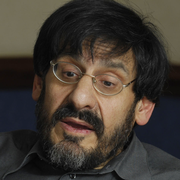
WHY does no one seem to have a problem with being forced to apply for a democratic citizen’s most basic right?
Voter registration weekend produced some excitement and the usual lectures on the importance of registering. No one paused to consider whether a democracy ought to expect citizens to jump through administrative hoops if they want to vote.
The vote is not only our most basic democratic right, it is the essence of citizenship. To be a citizen is to enjoy a say in the decisions that affect us; the most basic is choosing who represents us and who governs.
And so it seems absurd that we should have to present ourselves to officials to claim an automatic right.
If our names appear on the population register, we enjoy the rights that come with citizenship — we don’t have to apply for them. We are required to apply for identity documents, but our status as citizens does not depend on owning one. Why, then, do we not require the government, which has a record of our details, to add all citizens’ name to the voters’ roll when they reach voting age, so making the right to vote what it should be, an automatic consequence of citizenship?
More is at stake than a matter of principle: forcing citizens to register can be a powerful antidemocratic tool as it can deny people the vote. This is how it is used in parts of the US — by imposing registration requirements some people can’t meet, parties exclude groups of voters who support their opponents. The poor are the prime targets and so the criteria might, for example, require voters to produce driving licences as a form of identity when it is known that many poor people don’t drive. So common has this "vote suppression" become that about 65-million eligible voters are not registered. Besides denying people a basic right, this may also create an illusion — that people are apathetic and don’t want to vote, when in reality they are prevented from voting.
Our registration criteria are not designed to exclude anyone — by holding its drives over weekends, the Independent Electoral Commission does try to ensure everyone can register (allowing registration only in office hours is often a ploy to exclude people who can’t get off work). But our insistence on registration may still deprive people of the vote. Surveys conducted before our first few elections suggest that registration did exclude some people. Credible polls found more people said they wanted to vote than registered, which suggests some people assumed to be "apathetic" were prevented from voting by registration procedures.
This may now be less of a problem. But many in the more than 20% of the citizenry who are not registered may be excluded not because they don’t want to vote, but because registration requirements mean they can’t.
Why do we have registration? Because it is convenient for officials to shunt the responsibility for voting rights onto citizens. Now, if you can’t vote, it is your problem. If the government was forced to register you, it would be its problem.
Requiring registration may reflect an elitism that assumes it is the citizen’s job to do what is convenient to the government, not the government’s task to do what works for citizens. There are many other examples.
Why is this never challenged? Most of those who are excluded are probably poor and so those who shape debate either do not care about a problem that affects others or believe that poor people should be forced to jump through hoops if they want the democratic rights the better-off enjoy.
Registration may also be a symptom of one of the results of not taking people at the grass-roots seriously — that the government often has a very weak presence on the ground, which may make it difficult to ensure an accurate voters’ roll. It may be convenient to insist that people claim their democratic rights rather than taking on the responsibility of ensuring that everyone who is eligible to vote makes it onto the roll.
There is a great irony in this. The argument that things should be done for the poor since they can’t do it themselves is common here — it is one reason many commentators don’t like social grants, which allow people to take their own decisions. But one thing the poor are expected to claim for themselves is the most basic of democratic rights.
There seems little chance that politicians and officials will question registration: it suits them and there is no public pressure against it. But a recent development could threaten the cosy consensus in favour of registration.
In at least three areas last weekend, activists called for boycotts of registration to support local demands. If boycotting registration becomes a trend, politicians and officials may consider automatic voting rights as a way of depriving activists of a stick with which to beat them. Unless that happens, we will continue to be expected to apply for our most basic political right.
By Prof Steven Friedman
Friedman is director of the Centre for the Study of Democracy.
Source: Business Day
